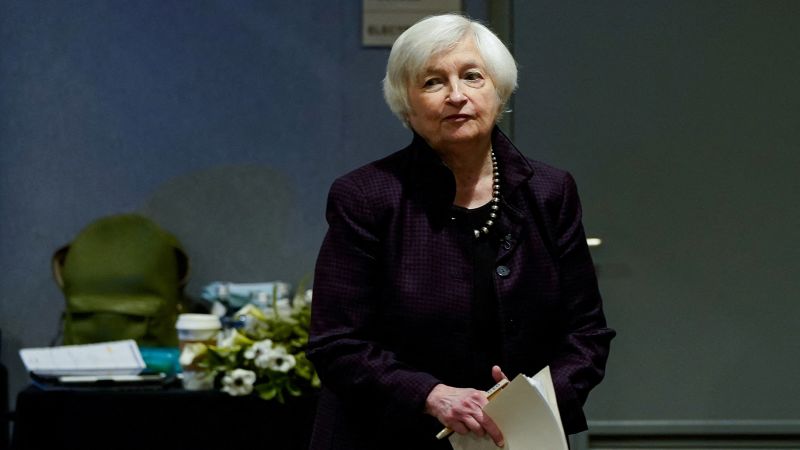CNN
—
The Treasury Department said Friday the US could default on its debt as soon as June, setting up one of the first major battles on Capitol Hill after Republicans took control of the House.
The US will reach the debt limit on January 19 and then “extraordinary measures” will need to be taken, Treasury Secretary Janet Yellen wrote in a letter to House Speaker Kevin McCarthy. She said that the Treasury Department will pursue those measures, but they will only last a limited amount of time.
It is unlikely that the government will exhaust its cash and the “extraordinary measures” before early June, though she said there is “considerable uncertainty” around that forecast, Yellen wrote. She urged lawmakers to “act in a timely matter” to increase or suspend the debt limit.
“Failure to meet the government’s obligations would cause irreparable harm to the US economy, the livelihoods of all Americans, and global financial stability,” she wrote.
The debt limit is the maximum that the federal government is allowed to borrow, after Congress set a level more than a century ago to curtail government borrowing. Congress has in the past raised the debt limit to avoid a default on US debt that economists have warned would be “financial Armageddon.” That’s what lawmakers did in late 2021 following the last standoff over the debt ceiling.
The immediate measures include some accounting maneuvers involving the Civil Service Retirement and Disability Fund, the Postal Service Retiree Health Benefits Fund and the Federal Employees Retirement System Thrift Savings Plan.
However, these moves will not affect retirees’ ability to access their savings, experts said. The funds will be made whole once the impasse is settled, Yellen wrote.
Yellen’s letter reinforced that the debt ceiling limit is an issue that Congress will have to deal with soon.
But it’s not an immediate problem, experts said.
“This is not the time for panic. We are many months away from the US being unable to meet all of its obligations,” said Shai Akabas, director of economic policy at the Bipartisan Policy Center. “But it is certainly a time for policymakers to begin negotiations in earnest.”
Just how long the Treasury Department can continue the “extraordinary measures” will depend in part on how much 2022 tax revenue the government collects this spring. Also, inflation and interest rates have risen faster than some experts estimated last year, and new policies, including the student loan forgiveness program, were introduced, potentially shortening the window.
House Republicans are preparing contingency plans, but dealing with the debt ceiling limit will not be an easy task for Congress, especially now that the GOP has taken control of the House. It is expected to unleash a battle between conservatives GOP members, who want to tie any lifting of the limit to spending cuts, and Democrats, who fiercely oppose any reductions.
The Washington Post first reported the emergency plans.
McCarthy, in part of his negotiations to become speaker, promised to pass a proposal by the end of March telling the Treasury Department which payments should be prioritized if the debt ceiling is breached, GOP Rep. Chip Roy confirmed to CNN.
Roy, one of the key players in the standoff over McCarthy’s speakership, cautioned that the contours of the proposal are still being worked out, noting there are several different versions of a payment prioritization plan circulating inside the House GOP.
McCarthy is stuck in the middle, with his party holding only a razor-thin majority in the chamber. Also, any member can call for a motion to vacate the speaker’s chair, one of several concessions McCarthy made to gain the top post after 15 rounds of voting last week.
What’s more, the debt ceiling negotiations will likely be tied to the fiscal year 2024 federal spending package, which Congress must pass before October 1 or risk a government shutdown.
The debt ceiling was last raised in December 2021 to $31.4 trillion.
The deadline comes sooner than some experts had expected. They were predicting the debt ceiling limit would not be breached until later this year, when the Treasury Department would have to start taking extraordinary measures to avoid defaulting on the government’s obligations.
Goldman Sachs warned last month that a close call could set off turmoil on Wall Street that causes losses in the retirement accounts and investment portfolios of everyday Americans.
“It seems likely that uncertainty over the debt limit in 2023 could lead to substantial volatility in financial markets,” Goldman Sachs economists wrote, noting that the 2011 standoff helped cause a deep selloff in the US stock market.
Beyond markets, Goldman Sachs said a failure to raise the debt limit in time “would pose greater risk to government spending and ultimately to economic growth than it would to Treasury securities themselves.”
That’s because in order to avoid a default on US debt, the federal government would shift money around to keep paying interest on Treasuries. That would create a massive hole that would need to be filled by delaying a host of other payments — including ones that millions of Americans count on such as paychecks to federal employees, benefits to veterans and Social Security payments.
“A failure to make timely payments would likely hit consumer confidence hard,” Goldman Sachs wrote.
The White House said Friday it will not offer any concessions or negotiate on raising the debt ceiling.
“We will not be doing any negotiation over the debt ceiling, but broadly speaking, at the start of this new Congress, we’re reaching out to all the members … making sure that we have those connections with those new members,” White House press secretary Karine Jean-Pierre said.
She said in the past “there’s been a bipartisan cooperation when it comes to lifting the debt ceiling, and that’s how it should be.”
“It should not be a political football,” she added. “This is not political gamesmanship, and this should be done without conditions.”
Asked why Yellen was notifying Congress just six days before the debt limit is reached, Jean-Pierre referred those questions to Treasury, but said the “sooner Congress acts the better.”
“Even the prospect of not raising the debt ceiling will damage the full faith and the credit of our nation,” she said. “There’s going to be no negotiation over it, this is something that must get done.”
This story has been updated with additional reporting.




















